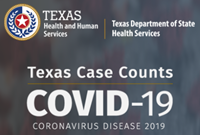The Texas Department of State Health Services is tracking cases of the new coronavirus that causes COVID-19. DSHS will update the state case count each day by noon Central Time.
The numbers include confirmed and presumptive positive cases of COVID-19 reported by local and regional public health jurisdictions to DSHS and are listed by the person’s county of residence. They do not include residents of other states who were repatriated from China or a cruise ship on a U.S. government flight to JBSA-Lackland in San Antonio.
The numbers reported here may differ from what’s being reported at the local level for two reasons. Local jurisdictions receive the initial laboratory results and may report them publicly before reporting those cases to DSHS. Some jurisdictions may report cases diagnosed or treated in their area, even if the person lives in another county.
People Tested
| Total | 1,268 |
|---|---|
| Public Labs | 656 |
| Private Labs | 612* |
*Includes lab reports from ARUP Laboratories, LabCorp and Quest Diagnostics. Additional providers are testing.
Texas COVID-19 Cases1
| Total Statewide Cases | 64 |
|---|---|
| Deaths | 1 |
To see county totals, scroll table below.
| County of Residence2 | Number of Cases3 |
|---|---|
| Bell | 1 |
| Bexar | 3 |
| Brazoria | 2 |
| Collin | 6 |
| Dallas | 9 |
| Denton | 1 |
| El Paso | 3 |
| Fort Bend | 9 |
| Galveston | 1 |
| Gregg | 1 |
| Harris | 10 |
| Hays | 1 |
| Lavaca | 1 |
| Matagorda | 1 |
| Montgomery | 3 |
| Smith | 3 |
| Tarrant | 3 |
| Travis | 3 |
| Webb | 1 |
| Pending County Assignment | 2 |
1DSHS will update the state case count each day by noon Central Time.
2Patient may be undergoing treatment in facilities in other counties.
3Does not include repatriation cases.
Occasionally, a county’s case count could go down. This would happen if a person was initially reported by one county, but the disease investigation determined they are actually a resident of another county or state.
There are simple steps everyone can take to help prevent the spread of respiratory viruses like COVID-19:
- Wash your hands often with soap and water for at least 20 seconds. If soap and water are not available, use an alcohol-based hand sanitizer.
- Avoid touching your eyes, nose, and mouth with unwashed hands.
- Avoid close contact with people who are sick.
- Stay home when you are sick.
- Cover your cough or sneeze with a tissue, then throw the tissue in the trash.
- Clean and disinfect frequently touched objects and surfaces.
Minimizing exposure is especially important for people who are 65 or older or who have an underlying health condition like heart disease, lung disease, diabetes, high blood pressure or cancer. People in those groups have a higher risk of developing severe disease if they do get COVID-19, and the safest thing for them during an outbreak will be to stay home as much as possible and minimize close contact with other people. To get ready, they should talk to their doctor about getting additional prescription medications and have enough household items and groceries on hand to stay home as needed.
DSHS has additional information on the COVID-19 for the public, health care professionals, health departments and labs at dshs.texas.gov/coronavirus.
.jpg)



 Click For Louisiana
Click For Louisiana
